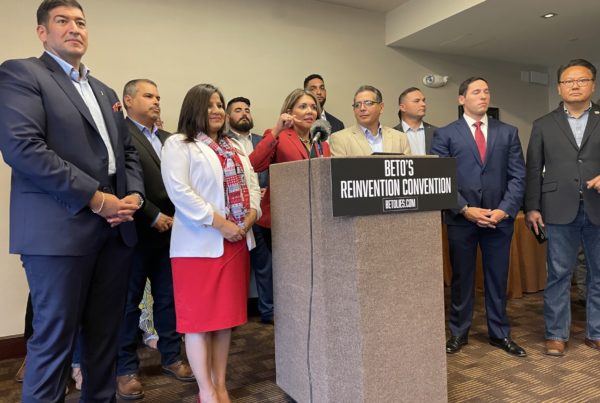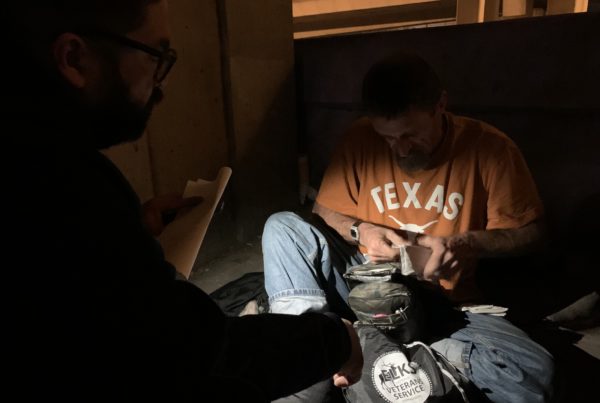Nearly 200,000 disabled Texans have been waiting for a decade or more to receive assistance such as employment training, residential care and behavioral support.
These and other services can be provided through various Medicaid waiver programs using state and federal funds. But the ballooning waitlist is putting a tremendous burden on families who are losing out on essential services, say disability advocates.
These findings are a part of an investigation by the Houston Chronicle’s Alex Stuckey, who joined Texas Standard to share more about the impact on disabled Texans.
This transcript has been edited lightly for clarity:
Texas Standard: Tell us a little bit more about these programs. Folks have been waitlisted for such an incredible length of time – more than 10 years, I guess some even longer.
Alex Stuckey: Yeah, there are some people that are in the 18-, 19-year timeframe right now. So there are these six Medicaid waiver programs that the state has for people with intellectual and developmental disabilities. And the idea is that it will keep them in the community getting care instead of in an institution or a nursing facility. And so, these programs, while the state does fund slots, they’re not funding nearly enough. And so, there are 170,000 people waiting for those services.
That’s an incredible number. Now you highlight how one family has been waiting for more than 10 years to get some state help for their adult son who’s autistic. Why is it taking so long for this family and others to get this assistance?
There’s simply not enough funding. This isn’t an entitlement. So it’s up to the state to fund the amount of slots they want. And we’re just not funding enough slots. Bottom line, there’s not enough money to go around to serve all the people who need the care.
Has there been much done by the Texas Legislature in recent years to try to work on getting this waitlist down?
They are finally starting to recognize that this is an issue. I think it was kind of one of those silent problems that no one was really talking about. So they’re not really putting that much money in. They’ve put $77 million recently, but that’s not nearly enough to make a dent. They are doing some studies to kind of look and see what other states have done to get people care and get their waitlist down. But it’s still very much in the early phases in that regard.
You write that this isn’t just a Texas problem; most states in the U.S. are struggling to address long waitlists for Medicaid waiver services. What about successful efforts, though? Have some states been able to find their way around this sooner, bring those wait times down, get families connected with the services?
Yeah, so Louisiana is a good example, and it’s one of the states that lawmakers are looking at to kind of model after. They had only a 10,000-person long line. So that’s a little different than Texas, but they went through and changed the way they do it so that they evaluate people when they join the list to determine their level of need. And if their level of need is, “I need help right now,” they pop them into the top of the list, and those people get services immediately.
So in Texas, that’s not done? There’s not a screening, priority or anything like that?
So there is a way, if it’s kind of an emergent or urgent situation, you can jump to the top of the line. But on the whole, they don’t evaluate or assess people until they reach the top of the list.
I’m a little surprised that given what folks know about this, especially in neighboring Louisiana, that this hasn’t this hasn’t happened sooner. But you say that lawmakers are looking at this?
Yeah, they are looking at it pretty loosely. I mean, one of the major things, again, is going to be the money. So it costs Louisiana money to evaluate 10,000 people, but we have 170,000 people that would have to be evaluated. So it’s like no small chunk of change that the Legislature would need to pump into the system to be able to even think about doing that.
Is there a round number that people talk about that’s needed?
The discussion has not gotten to that yet, but I am confident it would be quite a bit.
Meanwhile, you write that there are more than 300,000 family caregivers in Texas for people with intellectual and developmental disabilities and only 7% receiving support from a state agency. If these families are not getting support from state services, what other options do they have that are affordable?
You know, I think that’s the issue — the affordable part. There are families like the family I wrote about that are a little more well-off. And so they can sort of like prevent the inevitable. Their loved one isn’t going to be on the street; they’re always going to have a home. But, you know, they all live kind of on this brink of like if something happens to me, what is going to happen to my child? Because there is no services and there is the issue of, for example, the family I wrote about, the mom’s a lawyer. She doesn’t know about how to take care of people with disabilities. So she can keep him clothed and feed him and keep a roof over his head, but she doesn’t know how to help him with his, you know, outbursts and his behavioral problems. She doesn’t know how to help him get a job.
What sort of reaction are you getting from readers and others?
It’s honestly overwhelming. I mean, so many stories of people saying like, me, too, I’m also on the list. It’s been 12 years. People are telling me they’ve been moving out of the state to get their children help because Texas is so bad at it.
You mentioned that there’s the money issue, but could a lot of this be alleviated by an attention to the mechanics of distribution for these services?
Yeah. You know, I do think that if we could get to a place like Louisiana where we just have it set up better so that people are evaluated periodically, instead of saying to a parent with a 3-year-old, put them on the list now so they get services at 20. You know, if we just like had a better system to make sure people were doing okay and didn’t need help and when they did need help were able to get it to them, I think that would definitely help a lot.















